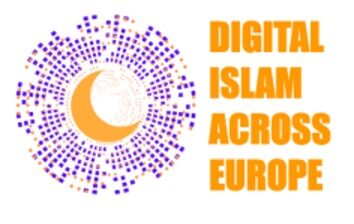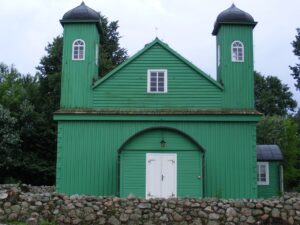POLAND (in English and Polish)
Polish Collection Introduction
Mateusz Chudziak (Polish Team)
Iga Wermińska-Wiśnicka (Polish Team)
Gary R Bunt (UK Team and Website data analysis)
Anna Grasso (UK Team and Website data analysis)
This archive is part of the Digital Islam Across Europe project’s collection. One of the DigitIslam project outputs focuses on website data and collection analysis. The objective is to identify, catalogue and analyse Muslim organisations’ and actors’ websites (Online Islamic Environments or OIEs) from these different countries 1.
The archive of Polish websites devoted to Islam contains several websites that differ in content and nature. They can be divided into several categories. These are the websites of official religious associations, local centres of Muslim culture (tagged as “mosques” because these centres perform such a fundamental function), associations without official status in Poland (Ahmadiyya, Shia associations, Hizmet), as well as other organisations, including one association created by non-Muslims, but devoted entirely to topics related to Islam and Muslims, as well as informational portals.
The websites of official associations in Poland (Muslim Religious Union in the Republic of Poland – MZR and the Muslim League – LM) contain basic information about the history and activities of these organisations, as well as introductory knowledge about Islam, news, and sometimes statements. The MZR website is slightly more extensive and includes a section devoted to the history of Islam in Poland (mainly Tatars) and links to broader resources, such as the Muslim library or the Tatar library (the websites of these libraries are included as separate links in our list).
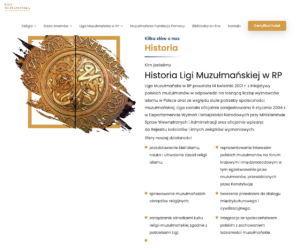
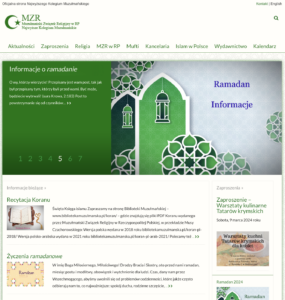
LM and MZR Websites
The websites of local Muslim cultural centres associated with the Muslim League look similar. The website of the centre in Wroclaw contains information about religious services and educational offers, while the website of the mosque in Warsaw is under construction. Other local centres are absent on the Internet.
Minority groups without official status are quite widely represented. First, Polish Shia are present on the Internet in several guises. These are the websites of the Association of Muslim Unity (resembling the websites of the above-mentioned official organisations), Ahl ul-Bayt, as well as the websites of Abiya and About Islam. The Ahmadiyya website mainly contains translations of articles written by Ahmadiyya authors from abroad, while Fethullah Gülen’s Hizmet movement operating in Poland runs Gülen’s website, as well as the website of the Danube Institute for Dialogue (NGO run by Hizmet). The first one contains information about Gülen and his articles, and the second one is a typical NGO website – it contains news about the Institution’s activities, galleries, and publications (both articles and books).
Portals devoted to Islam, which are grassroots initiatives, constitute a separate category. These include Planeta Islam – a portal of knowledge about Islam with hadiths, comments, and discussions on religious topics. The others are Islam without Secrets and Hidaya 2 – similar but with less content than Planeta Islam.
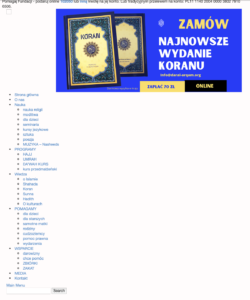
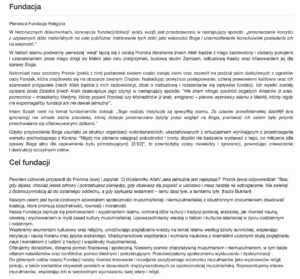
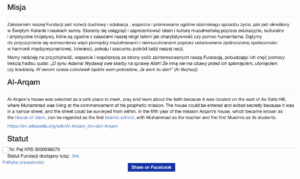
Dar al-Arqam website screenshots
The list also includes the websites of two institutes of different nature. The first is the Halal Institute, which contains only information about the possibility of obtaining halal certificates and channels for establishing business cooperation. The second is a think tank with news, analyses, and broader publications – articles and books. However, its activity has decreased over the last few years and is no longer as active as before.
The last category is SalamLab, which is available in two versions – Polish and English. This is one of the most active sites. SalamLab is a non-Muslim NGO. Its goal is to disseminate knowledge about Islam, Muslims, and the Middle East. It regularly publishes articles, analyses, and interviews.
This archive consists of an initial capture. We will be updating this list in due course. We believe this data can become a useful tool for researchers and the general public who have an interest in digital Islam across Europe as well as those who are mostly focused on the study of Islam or comparative religion within the Polish or Eastern European context. Moreover, the analysis of these sites will be part of a wider project output through presentations and publications.
- For more information on this: https://blogs.ed.ac.uk/digitalislameurope/research-findings/archiving/ back
- The website of Dar al-Arqam was part of this category, yet it is no longer active. It can be accessed through Wayback Machine https://web.archive.org/web/20230925131916/https://daral-arqam.org/ back
Wprowadzenie do Kolekcji Polskiej
Mateusz Chudziak (Polish Team)
Iga Wermińska-Wiśnicka (Polish Team)
Gary Bunt (UK Team and Website data analysis)
Anna Grasso (UK Team and Website data analysis)
To archiwum jest częścią kolekcji projektu Digital Islam Across Europe. Jednym z rezultatów projektu DigitIslam skupia się na analizie danych i zbieraniu informacji ze stron internetowych. Celem jest zidentyfikowanie, skatalogowanie i zanalizowanie witryn organizacji i podmiotów muzułmańskich (Środowiska Islamu Online lub OIE) z różnych krajów 1.
W archiwum polskich stron internetowych poświęconych islamowi znajdują się witryny internetowe różniące się treścią i charakterem. Można je podzielić na kilka kategorii. Są to strony internetowe oficjalnych związków wyznaniowych, lokalnych ośrodków kultury muzułmańskiej (oznaczonych jako „meczety”, bo ośrodki te fundamentalnie pełnią właśnie taką funkcję), stowarzyszeń niemających w Polsce oficjalnego statusu (Ahmadiyya, stowarzyszenia szyickie, Hizmet), a także innych organizacji , w tym jedno stowarzyszenie utworzone przez niemuzułmanów, ale w całości poświęcone tematyce związanej z islamem i muzułmanami. Do tego zbioru dodać można także portale informacyjne.
Na stronach internetowych oficjalnych związków działających w Polsce (Muzułmańskiego Związku Religijnego w RP – MZR i Ligi Muzułmańskiej – LM) znajdują się podstawowe informacje o historii i działalności tych organizacji, a także wstępne informacje na temat islamu, aktualności, a czasem oświadczenia. Strona MZR jest nieco obszerniejsza i zawiera dział poświęcony historii islamu w Polsce (głównie to historia Tatarów) oraz linki do szerszych zasobów, takich jak Biblioteka Muzułmańska czy Biblioteka Tatarska (strony internetowe tych bibliotek podane są jako odrębne w naszym zbiorze).


Strony internetowe LM i MZR
Podobnie wyglądają strony internetowe lokalnych ośrodków kultury muzułmańskiej zrzeszonych w Lidze Muzułmańskiej.Strona internetowa ośrodka we Wrocławiu zawiera informacje o usługach religijnych i ofercie edukacyjnej, natomiast strona internetowa meczetu w Warszawie jest w przebudowie. Inne lokalne ośrodki są nieobecne w Internecie.
Grupy mniejszościowe nieposiadające oficjalnego statusu są dość szeroko reprezentowane. Po pierwsze, polscy szyici obecni są w Internecie w kilku odsłonach. Są to strony internetowe Stowarzyszenia Jedności Muzułmańskiej (przypominające strony wyżej wymienionych oficjalnych organizacji), Ahl ul-Bayt, a także strony Abiya i O islamie.Serwis Ahmadijji zawiera głównie tłumaczenia artykułów autorów Ahmadijji z zagranicy, natomiast działający w Polsce ruch Hizmet Fethullaha Gülena prowadzi stronę internetową swojego przywódcy, a także stronę internetową Dunaj – Instytutu Dialogu (organizacji pozarządowej prowadzonej przez Hizmet). Pierwsza zawiera informacje o Gülenie i jego artykuły, druga to typowa witryna organizacji pozarządowej – zawiera aktualności na temat działalności instytucji, galerie oraz publikacje (zarówno artykuły, jak i książki).
Osobną kategorię stanowią portale poświęcone islamowi, będące inicjatywami oddolnymi. Należy do nich Planeta Islam – portal wiedzy o islamie, zawierający hadisy, komentarze i dyskusje na tematy religijne. Pozostałe to Islam bez tajemnic lub Hidaya 2 – podobne, ale zawierające mniej treści niż Planeta Islam.



Zrzuty ekranu ze strony internetowej Dar al-Arqam
Na liście znalazły się także strony internetowe dwóch instytutów o różnym charakterze. Pierwszy to Instytut Halal, w którym znajdują się jedynie informacje o możliwości uzyskania certyfikatów halal i kanałach nawiązania współpracy biznesowej. Drugi to Instytut Studiów nas Islamem – think-tank z aktualnościami, analizami i szerszymi publikacjami – artykułami i książkami. Jednak w ciągu ostatnich kilku lat jego aktywność zmalała i nie podejmuje on już tak wielu incjatyw, jak wcześniej.
Do ostatniej kategorii zaliczyć można SalamLab, który dostępny jest w dwóch wersjach – polskiej i angielskiej. To jedna z najbardziej aktywnych stron. SalamLab jest niemuzułmańską organizacją pozarządową. Jej celem jest szerzenie wiedzy o islamie, muzułmanach i Bliskim Wschodzie. Regularnie publikuje artykuły, analizy i wywiady.
To archiwum składa się z początkowego przechwycenia. Będziemy aktualizować tę listę w odpowiednim czasie. Wierzymy, że te dane mogą stać się przydatnym narzędziem dla badaczy oraz ogółu społeczeństwa zainteresowanego cyfrowym islamem w Europie, a także tych, którzy skupiają się głównie na badaniach nad islamem lub porównawczą religią w kontekście Polskim lub Europy Wschodniej. Ponadto analiza tych stron będzie częścią szerszego wyniku projektu poprzez prezentacje i publikacje.
- Dla więcej informacji na ten temat: https://blogs.ed.ac.uk/digitalislameurope/research-findings/archiving/ back
- Strona internetowa Dar al-Arqam była częścią tej kategorii, ale już nie jest aktywna. Można się do niej dostać poprzez Wayback Machine https://web.archive.org/web/20230925131916/https://daral-arqam.org/ back
